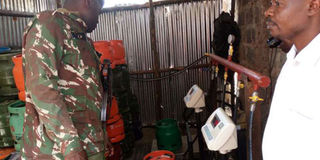Team unearths cooking gas racket in Ruiru

Some of the cooking gas cylinders found being filled with Liquid Petroleum Gas at a residential house in Ruiru on March 9, 2016. PHOTO | ROBERT NGUGI | NATION MEDIA GROUP
What you need to know:
Two people, a woman and her son, were arrested in connection to the business that was being run inside a residential plot with 17 occupied units.
Ms Mary Kimani, who owns the plot, tanker and business, told the police that she had only set up the business this week because she needed money to support her family.
The multi-agency team comprised officers from Anti-Counterfeit Agency, Energy Regulatory Commission, Petroleum Institute of East Africa and Kenya Police Service.
A multi-agency team on Wednesday unearthed a multi-million shilling racket involving the sale and distribution of cooking gas by unlicensed dealers in Ruiru.
The team comprising officers from the Anti-Counterfeit Agency, Energy Regulatory Commission, Petroleum Institute of East Africa and Kenya Police Service stormed the house early morning and found the refilling of cylinders from a 5.8-tonne container of Liquefied Petroleum Gas going on.
Two people, a woman and her son, were arrested in connection to the business that was being run inside a residential plot with 17 occupied units.
The LPG tanker was dangerously packed between the houses and pipes directed to the temporary structure where the weighing machines had been set up.
Despite the danger, one of the plot tenants was cooking bans for sale just next to the tanker as children played between the cylinders.
Over 200 cylinders of varying sizes and belonging to different petroleum companies were impounded during the operation.

The proprietor of the illegal cooking gas business in Ruiru, Ms Mary Kimani, at her Liquefied Petroleum Gas (LPG) filling station on March 9, 2016. PHOTO | ROBERT NGUGI | NATION MEDIA GROUP
Ms Mary Kimani, who owns the plot, tanker and business, told the police that she had only set up the business this week because she needed money to support her family.
“I know this is illegal and I am sorry for myself that I had to be arrested for doing an illegal business but this is the only way I can feed my family. It is worth the risk,” the unapologetic Mrs Kimani said.
She said she was aware of the risks the business posed to her tenants and said that she had cautioned them not to light fires outside but some of them were ‘stubborn’.
“I only fill the cylinders during the day when the houses are empty or have few people. I am happy there have been no accidents,” said Ms Kimani.
On further interrogation by the Anti-Counterfeit Agency, she depicted someone who knew little or nothing about the safety precautions such as how to spot leakages and handle fumes.
The Anti- Counterfeit Agency’s Inspector Clement Echoto said the business posed a serious threat to the people and environment.
“LPGs are highly flammable and even the slightest fumes posed a danger of fire. They are also harmful to inhale,” Mr Echoto said.
In addition, Mr Echoto said that the environment under which the plant had been set up was highly risky.
“The tanker is parked just outside toilets which also emit highly flammable gasses, and inside the filling place there are fluorescent bulbs with starters which can catch fire any time. There are houses here. People cooking and lighting jikos are at a very high risk,” Mr Echoto said.
Residents interviewed by Nation said the plant had been operational for more than a year and that the gas is supplied to several dealers.
The Energy Bill 2014 proposed raising the fines charged unscrupulous gas traders from Sh5,000 to Sh1 million, amid complaints that the previous laws were lenient and encouraged the unlicensed trade.
Data from the Energy Regulatory Commission indicates that Kenya consumes 95,000 tonnes of cooking gas every year but it has the potential of using one million.
The law requires that one demonstrates that he or she owns 5,000 cylinders to be licensed as a dealer.





